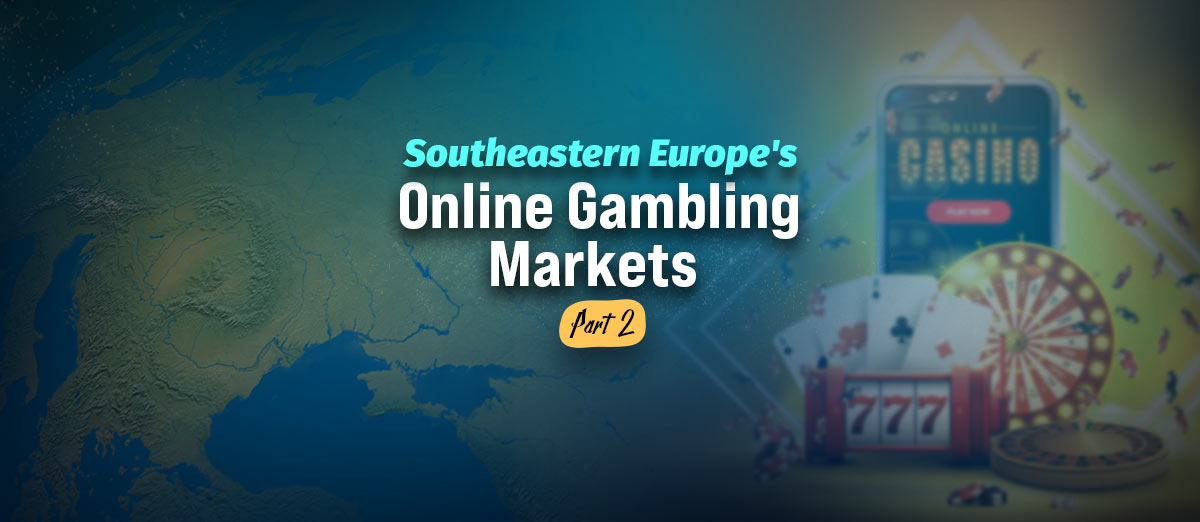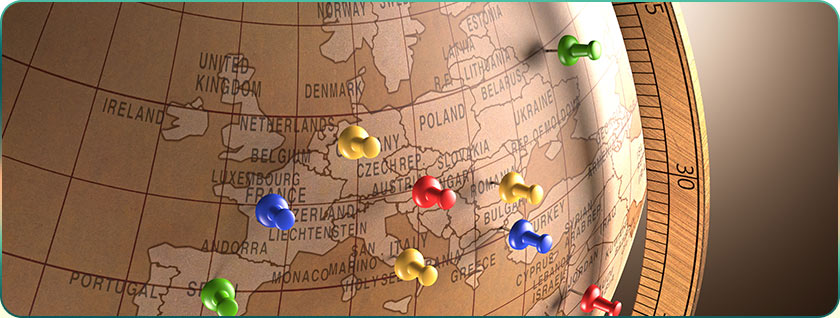The Rise of Southeastern Europe in the Global Online Gambling Scene: Part 2

Southeastern Europe's Online Gambling market has not been tapped to its full potential, according to some specialists, it lies in the shadow of its bigger brother in the face of Central Europe and the other big players in the industry like the US, LATAM and Canada.
In our Southeastern Europe's Gambling Market Part 1, we discussed the rapidly growing online gaming industry in that region, we were able to discern a number of interesting facts, not least of which is that this small pocket of the continent has a lot of potential.
With Greece being arguably the most notable, or at least the most well-established, there are certainly others that are primed to make a move and gain additional traction.
Below, we take a look at the online gambling market of other Southeastern European countries that have been making a move and just what the implications may be for the rest of the market.

Montenegro
What may come as a surprise to many, is that this Balkan state has really cemented itself as one of the most stable economies in the region. Investors are flocking there; especially to the capital; Podgorica, which has steadily been attracting interested parties from all over the globe across multiple sectors.
One of the governmental mandates in Montenegro is that it seemingly encourages and is open to the idea of foreign investment to either improve existing industries or introduce new ones, and the live casino and betting industry is certainly one that has ticked this box.
Statistics indicate that 40 percent of just over 625,000 of Montenegro’s population participate in online gambling regularly, while the efficiency of the industry in the country is considered to be up there as one of the most highly regarded in the world.
Having accepted new gaming regulation in 2011 (five years after this was passed for land-based gaming sites), it has gradually been increasing in popularity over the years, while only recently has the market demonstrated the amount of potential that it has.
Following significant investment in industries that include (but have not been limited to) telecommunications, software as a service (SAAS) and financial services over the last decade, Montenegro’s economy is certainly one to watch, with the continued rise of the gambling industry in the region.
Statista has estimated that the projected market volume growth of the online gambling industry in Montenegro will reach US$22.39m by 2027 - impressive numbers when you consider the size of the population.
This, of course, is considering an increase in earnings nationally due to the emergence of new industries as a result of continued foreign investment. Don’t shout about it just yet, but Montenegro could well become a force in the European online gambling market.
Croatia
Arguably made considerably more famous by the Game of Thrones television series over the last decade, Croatia is a country that has witnessed a significant economic surge that benefited a number of industries.
Since 2014 all forms of gambling have been legal in the country (apart from fantasy sports), however, as is often the case in quite a lot of markets, every online gambling site that operates there is required to have a partnership with a land-based casino in addition to having their office and servers registered and located in the country.
An online gambling license in Croatia costs in the region of $430,000 per year, with this being valid for up to 15 years. Additionally, just over $575,000 of the share capital must be registered throughout the entirety of the operator’s term.
Croatia does make a considerable amount from taxation placed on operators, and these are divided in a number of ways. Sports betting companies are required to pay 5 percent of their annual turnover, while, interestingly, for online casinos, this jumps to 15 percent of GGR in addition to 25 percent of their GGR from slots.
Curiously, the country is one of the only ones that taxes players on winnings up to a certain threshold. Winnings over $1,439 are taxed at 10 percent, $4,319 by 15 percent, 25 percent up to $73,000 and 30 percent on any winnings that exceed this.
Statista estimates that by 2027, there will be a projected market volume of US$557.40m in Croatia, which would be just over a 100 percent growth rate on the predicted figure for 2023.
Currently, though, none of the major global operators (Fanduel, MGM, Draftkings, Caesars) have taken the decision to penetrate the Croatian market, suggesting that they may well be keeping a close eye on the developments in the country. Certainly, the taxation on player winnings is likely to be seen as a downside, regardless of how attractive they may be able to make their offers.
However, should big operators see any potential value, part of the negotiation could be that this is scrapped in exchange for a larger percentage of taxation on GGR. It remains to be seen how the market will unfold in terms of global popularity for the industry.
Slovakia
According to a study conducted by 6W Research, it is believed that the Slovakian online gambling market will have grown by 8.6 percent between 2020 and 2026. While the land-based casino sector is holding its own, much of this being attributed to an increase in tourism as well as foreign investment, over recent years, revenue has also been boosted in the country because of the legalization of online casinos.
Compared to some of its rival Southeastern European countries, Slovakia does have a number of notable online casinos and sports betting brands available to residents (well in excess of 60), including Betway, BetVictor, Mr Green, Bwin and Unibet.
Meanwhile, the country also boasts notable software providers which have licenses, with CT Interactive having recently expanded in Slovakia (and Serbia), following a partnership with local online casino Eurogold, which should help to raise its profile.
Ivan Zoumpalov, Manager of Business Development at CT Interactive, said of the recent expansion: “This deal marks another step in our growth policy in Slovakia and Europe. We are sure we will help Eurogold to reach new highs in the country by supplying them with top-quality games.”
Furthermore, Martin Vaško, Technical Director of Eurogold, added: “We consistently strive to provide players with exciting, innovative products and CT Interactive’s reputation lives up to these values. Our brand’s offering will benefit from both the classic and modern games of the company.”
Like Montenegro, Slovakia may just surprise the online gambling industry over the next few years, especially if projected growth figures are anything to go by.

Potential of Southeastern Europe's Online Gambling Market
While Southeastern Europe can't be compared to gambling powerhouses like LATAM or the US, it's evident that several nations within this region are drawing increased scrutiny from industry experts.
Countries that have garnered global investments in recent years, especially in the gambling sector, are undoubtedly on the radar. As observed in certain Latin American markets, such investments can be transformative.
However, the legislative landscape remains a pivotal factor. Nations with stringent regulations and hefty tax burdens on operators will need to navigate these challenges to truly realize their potential in the online gambling arena.
As the next few years unfold, it will certainly be interesting to see which of these countries that we have covered are the most prominent in the industry. Without a doubt, there are a couple that could well spring a surprise, perhaps even challenging bigger markets across the rest of Europe single-handedly.





Review this Blog
Leave a Comment
User Comments
comments for The Rise of Southeastern Europe in the Global Online Gambling Scene: Part 2